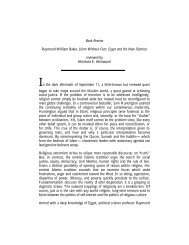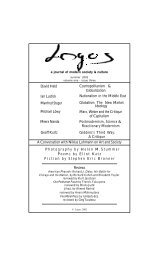Michael J. Thompson Stephen Eric Bronner Wadood Hamad - Logos
Michael J. Thompson Stephen Eric Bronner Wadood Hamad - Logos
Michael J. Thompson Stephen Eric Bronner Wadood Hamad - Logos
You also want an ePaper? Increase the reach of your titles
YUMPU automatically turns print PDFs into web optimized ePapers that Google loves.
<strong>Michael</strong> J. <strong>Thompson</strong><br />
Tax Reform and Political Opportunism: Bush in Context<br />
THE TREND TOWARD TAX REFORM in the 1980s was, it should be admitted,<br />
the result of many legitimate economic pressures. The problem was not in<br />
the changing economics of global capitalism but in the way the politics of the<br />
right in America—as well as other nations—used this economic pressure for<br />
its own ideological ends. This can be explained in the flowing way. During<br />
the post-war years, there was a general consensus among policy makers that<br />
taxes should be progressive and used as tools for economic management.<br />
Throughout the 1950s and 1960s, this Keynesian logic made possible<br />
spending on large social programs and the investment in infrastructure.<br />
Business and the wealthy paid large marginal tax rates as opposed to the poor,<br />
working, and middle classes. This form of redistribution that allowed<br />
working people and even entire regions of the country to migrate to<br />
improved living conditions and to enjoy improved social services and public<br />
goods.<br />
Arguments were often made about the degree to which these taxes were<br />
indeed progressive. Political élites—more often than not representatives of<br />
business interests—made the argument time and again that a reduction of<br />
taxes would mean an increase in economic growth and productivity (a rise in<br />
GDP). However, such political arguments had very little support. First, there<br />
was the problem of politics. Americans overwhelmingly supported progressive<br />
taxation since the majority of them benefited from it directly. But next, the<br />
few studies that were made on the link between taxation and economic<br />
growth showed that there was no relationship at all. 4 Anti-tax political<br />
rhetoric therefore lacked, through the 1950s and 1960s and well into the<br />
1970s, any political support from the citizenry of the United States and also<br />
any empirical support from the social science establishment.<br />
This situation began to change in the late 1970s. For one thing, as American<br />
workers began to prosper they also started moving up in income tax brackets<br />
and getting hit by increasingly higher tax rates. This was part of the system’s<br />
design, and it also showed the old system was actually working. Tax revenues<br />
were supposed to grow automatically since “as the economy expanded,<br />
inflation pushed more and more individuals into higher and higher tax<br />
brackets as their nominal incomes increased.” 5 The tax system that had been<br />
devised and implemented in the 1950s and early 1960s began to lose its<br />
redistributive impact since the classes that, in the past, had benefited from<br />
the redistribution of wealth were now being taxed at ever higher rates and the<br />
<strong>Logos</strong> 2.3 – Summer 2003




